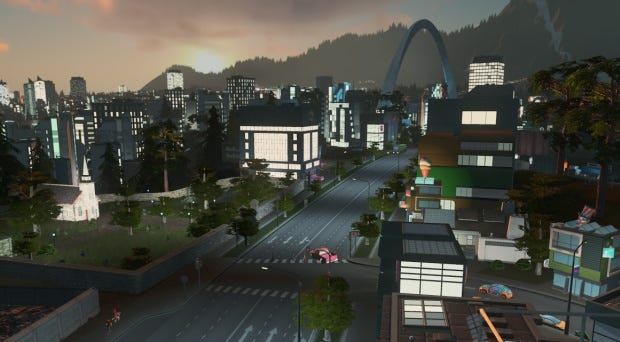Crime, Clubs And Beach Bars: Cities Skylines - After Dark
SinCity
Delving into the glamour, glitz and grime of nightlife, Cities: Skylines' first expansion, After Dark, introduces revamped crime mechanics, specialised commercial areas, beachfront entertainment and a day/night cycle. We've been looking at the expansion in the company of developers Colossal Order.
What do you give to the game that has everything?
Nobody - developers Colossal Order included - would argue that Cities: Skylines contained every feature that a citybuilder could possibly need, but the robust modding support and creativity of the community have led to a metropolis of new content. From a first-person viewpoint to plant you in the head of your citizens to thousands of new buildings, Skylines has received a great deal of support from its many modders.
The first expansion, just announced by Paradox, seeks to expand the game in ways that the modders can't. Going by the name After Dark, it adds a day/night cycle and new zoning specialisations and services to take advantage of the nightlife. Along with the expansion, Paradox and Colossal Order will be releasing a free update that brings some improvements to the base game. The free update will include the day/night cycle itself, allowing you to see your cities glowing in the dark, but the extra features that take advantage of the small hours are only available to those who pay for the DLC. The price, we're told, will be around the same as a a "regular Paradox expansion". Think Crusader Kings II and Europa Universalis IV DLC, which generally ranges between £4.99 and £9.99.
When the sun goes down, people who live in real cities tend to hit the town and spend all of their hard-earned on overpriced fizzy lager. Then they fall over and someone steals their phone. That seems to be the case in Cities: Skylines as well. The new leisure specialisation for commercial zones sees them cluster with bars, nightclubs and casinos. They operate as ordinary commercial properties during the day and experience a boom in business at night. While profitable, the bright lights of leisure districts create new problems for your consideration.
Traffic is the primary concern, just as it is one of the primary concerns of the city as a whole. Leisure zones attract an increased flow of citizens at night, which can create temporary bottlenecks and change the pattern of traffic around the city. Instead of travelling to work and then back to their houses, with an occasional detour to the park, citizens will now require access to work, home and leisure, using different routes at different times.
To complicate matters, they're also more likely to use public transport at night rather than designated themselves as dangerous drivers. Trains and buses are an option but taxi services will also be included in the expansion. Rounding out the improvements to transport are bicycles, which can be restricted to dedicated cycle lanes, and multi-purpose transport hubs. For the latter, think of the train or metro station within an airport or the rail connections to a cargo harbour. The multi-purpose buildings mean that you won't have to plonk two buildings side by side if one is large enough to contain both functions. And it means that citizens won't have to walk out of an airport and straight into the train station next door.
Tidier cities should result, aided by bus terminals that connect multiple routes within one building, and the other new specialisation: commercial beach properties. As well as entertaining the plebs, shoreline activities perform a far more important function; they make cities look prettier. No more tiny buffers of land between a residential zone and the sea and no more disconnect between the water and the land. As marinas, fishing tours, beach bars and restaurants are constructed, there should be a natural fit between shore and city.
Returning to nightlife, there is the issue of the bad behaviour that a night on the fizz sometimes causes, as well as the less desirable activities that occur under the cloak of darkness. Crime is an issue and the way Skylines handled it was an issue for Colossal Order.
The developers weren't satisfied with the policing systems in the base game so as well as introducing a cyclical rise in criminal activity during the night-time phases, they've introduced jails. Now, police will actually travel to the location of a crime, collect the criminal and take that criminal to a jail. That'll feed into traffic flow again - if the police can't reach the scene, they can't do much about the crime - but sirens will presumably clear a path in most situations.
Jails will fill up, however. As soon as modders add Iso-Blocks, and they surely will, it'll finally be possible to construct a Mega-City One, complete with entire neighbourhoods set aside for the housing of the criminal population.
Any excuse to revisit Skylines - our inaugural game of the month in April - is fine by me and After Dark seems like a strong expansion. Watching cities light up as the sun goes down taps into the hypnotic quality that comes from observing the flow of digital life, and the ongoing work going into the underlying systems is more than welcome.













